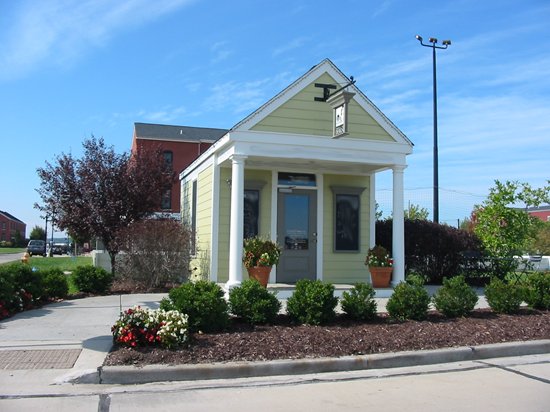| Back to Back Issues Page |
 |
|
Your April Useful Community Plus April 25, 2024 |
See the latest at the Useful Community Development website. 
It seems like every other young couple shopping for a home on TV is very assertive at the outset about wanting to be able to walk to restaurants, bars, and shops. Both young hipsters looking for eco-friendly places to live and residents of lower-income urban neighborhoods would like to have good places to shop for basic necessities. So why aren't there more corner grocery stores instead of mega-parking lot supermarkets? Why does Grandma have to wander around a 45,000 square foot store to find a head of lettuce, loaf of bread, and carton of milk? Part of the answer is that the grocery business is a low-margin one, so it takes more space to make a living. But another piece of the puzzle is that we are not creating any incentives or buzz for alternatives to the big supermarket and the convenience store. Envision in this tiny 12 X 12 foot space dairy and eggs on the left side; refrigerated produce across the back; bread, tomatoes, and a very few staples on the right side; and maybe a low frozen food case and self-checkout station in the middle. If that's too crazy for you, you could expand the dimensions a bit and still reduce automobile trips to the store. In lower-income areas that qualify as "food deserts," where there is no neighborhood place to buy healthy food, this could even create reasonable options. Due to lack of economies of scale, public incentives probably would probably be needed to poke the private sector into providing such options, but wouldn't it be worth it to make a truly walkable community?

We want to renew our pitch for you to ask questions directly to our website. Our editors will take a crack at answering, and others might have something to add too. Go to the community development question page and scroll down to the form where you can input your question. Don’t be concerned about whether you have put it in the right category, or any category—we can take care of that!
This isn't exactly reading, but watching. I'm intrigued by a May 3 interactive webinar, 12-2 pm Eastern Daylight Time (New York). Aimed at community organizations such as CDCs and maybe neighborhood associations, "Storied Communities: Community Stories" is based on a project in which writers were paired with researchers to explore how well community organizations are aligned with resident concerns and desires. The Eventbrite signup for this free webinar gives a good agenda and introduction to what it will cover. I'll be watching. Has your city been removing encampments of unhoused people? If so, check out this article about the fiscal impacts of this method of dealing with the problem. READ ARTICLE closely Downcitydesign is a great website describing what has been learned during the course of 15 years of youth-led projects to improve public spaces. The site includes a change agent tool-kit describing some hands-on projects as means to the end of cultivating design thinking skills among young people. If you are involved in a youth project, you can't miss this great resource. Some of you will want to watch what comes out of the Housing Assistance Center's new project on preserving multifamily housing in rural areas. Keep in mind that when this groups says "rural," they mean small towns too. If you ever wonder about the differences, if any, among the many terms used in talking about housing issues, see Shelterforce magazine's take on what each means. If that doesn't make your head spin, it's time to browse through the contents of the housing section of our website.
In the last few days, we have answered questions from you, our readers, generating these new pages on our site: What Should We Do About an Ugly Bioswale? What Is the Smallest Lot Size We Should Allow in Our Suburb?
We will return with the next issue of Community Development Plus on a Thursday in May. Feel free to reply to this email if you have a comment. For questions, please use the public-facing page to ask your question. We answer them on a page that becomes viewable on our website, but don't worry, your email address won't show and you can remain anonymous if you wish. |
| Back to Back Issues Page |

